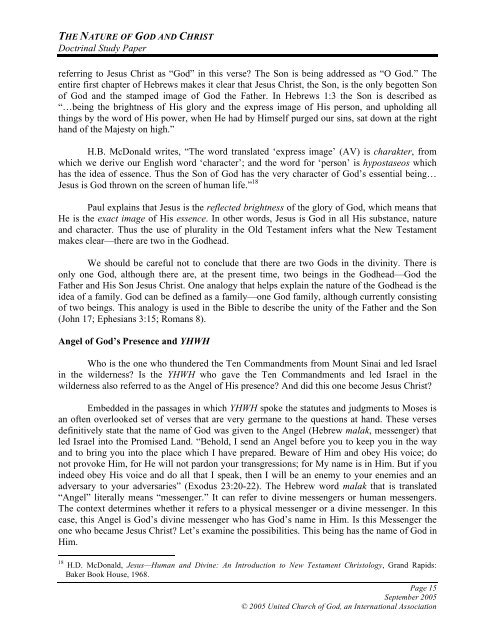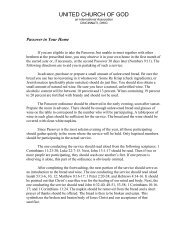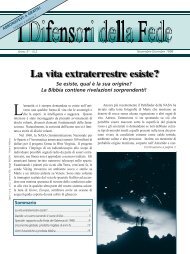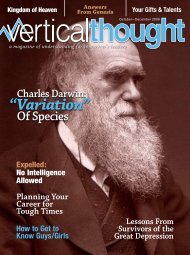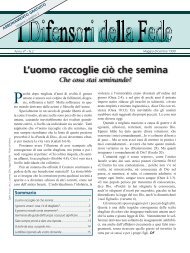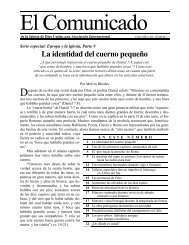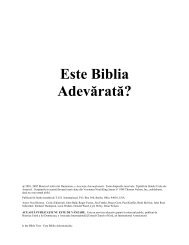The Nature of God and Christ - Members Site - United Church of God
The Nature of God and Christ - Members Site - United Church of God
The Nature of God and Christ - Members Site - United Church of God
- No tags were found...
You also want an ePaper? Increase the reach of your titles
YUMPU automatically turns print PDFs into web optimized ePapers that Google loves.
THE NATURE OF GOD AND CHRISTDoctrinal Study Paperreferring to Jesus <strong>Christ</strong> as “<strong>God</strong>” in this verse? <strong>The</strong> Son is being addressed as “O <strong>God</strong>.” <strong>The</strong>entire first chapter <strong>of</strong> Hebrews makes it clear that Jesus <strong>Christ</strong>, the Son, is the only begotten Son<strong>of</strong> <strong>God</strong> <strong>and</strong> the stamped image <strong>of</strong> <strong>God</strong> the Father. In Hebrews 1:3 the Son is described as“…being the brightness <strong>of</strong> His glory <strong>and</strong> the express image <strong>of</strong> His person, <strong>and</strong> upholding allthings by the word <strong>of</strong> His power, when He had by Himself purged our sins, sat down at the righth<strong>and</strong> <strong>of</strong> the Majesty on high.”H.B. McDonald writes, “<strong>The</strong> word translated ‘express image’ (AV) is charakter, fromwhich we derive our English word ‘character’; <strong>and</strong> the word for ‘person’ is hypostaseos whichhas the idea <strong>of</strong> essence. Thus the Son <strong>of</strong> <strong>God</strong> has the very character <strong>of</strong> <strong>God</strong>’s essential being…Jesus is <strong>God</strong> thrown on the screen <strong>of</strong> human life.” 18Paul explains that Jesus is the reflected brightness <strong>of</strong> the glory <strong>of</strong> <strong>God</strong>, which means thatHe is the exact image <strong>of</strong> His essence. In other words, Jesus is <strong>God</strong> in all His substance, nature<strong>and</strong> character. Thus the use <strong>of</strong> plurality in the Old Testament infers what the New Testamentmakes clear—there are two in the <strong>God</strong>head.We should be careful not to conclude that there are two <strong>God</strong>s in the divinity. <strong>The</strong>re isonly one <strong>God</strong>, although there are, at the present time, two beings in the <strong>God</strong>head—<strong>God</strong> theFather <strong>and</strong> His Son Jesus <strong>Christ</strong>. One analogy that helps explain the nature <strong>of</strong> the <strong>God</strong>head is theidea <strong>of</strong> a family. <strong>God</strong> can be defined as a family—one <strong>God</strong> family, although currently consisting<strong>of</strong> two beings. This analogy is used in the Bible to describe the unity <strong>of</strong> the Father <strong>and</strong> the Son(John 17; Ephesians 3:15; Romans 8).Angel <strong>of</strong> <strong>God</strong>’s Presence <strong>and</strong> YHWHWho is the one who thundered the Ten Comm<strong>and</strong>ments from Mount Sinai <strong>and</strong> led Israelin the wilderness? Is the YHWH who gave the Ten Comm<strong>and</strong>ments <strong>and</strong> led Israel in thewilderness also referred to as the Angel <strong>of</strong> His presence? And did this one become Jesus <strong>Christ</strong>?Embedded in the passages in which YHWH spoke the statutes <strong>and</strong> judgments to Moses isan <strong>of</strong>ten overlooked set <strong>of</strong> verses that are very germane to the questions at h<strong>and</strong>. <strong>The</strong>se versesdefinitively state that the name <strong>of</strong> <strong>God</strong> was given to the Angel (Hebrew malak, messenger) thatled Israel into the Promised L<strong>and</strong>. “Behold, I send an Angel before you to keep you in the way<strong>and</strong> to bring you into the place which I have prepared. Beware <strong>of</strong> Him <strong>and</strong> obey His voice; donot provoke Him, for He will not pardon your transgressions; for My name is in Him. But if youindeed obey His voice <strong>and</strong> do all that I speak, then I will be an enemy to your enemies <strong>and</strong> anadversary to your adversaries” (Exodus 23:20-22). <strong>The</strong> Hebrew word malak that is translated“Angel” literally means “messenger.” It can refer to divine messengers or human messengers.<strong>The</strong> context determines whether it refers to a physical messenger or a divine messenger. In thiscase, this Angel is <strong>God</strong>’s divine messenger who has <strong>God</strong>’s name in Him. Is this Messenger theone who became Jesus <strong>Christ</strong>? Let’s examine the possibilities. This being has the name <strong>of</strong> <strong>God</strong> inHim.18 H.D. McDonald, Jesus—Human <strong>and</strong> Divine: An Introduction to New Testament <strong>Christ</strong>ology, Gr<strong>and</strong> Rapids:Baker Book House, 1968.Page 15September 2005© 2005 <strong>United</strong> <strong>Church</strong> <strong>of</strong> <strong>God</strong>, an International Association


